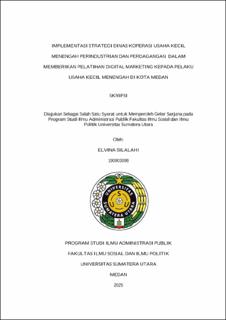| dc.description.abstract | Information and communication technology has advanced rapidly, yet its utilization among Small and Medium Enterprises (SMEs) remains limited. This is partly due to the fact that internet users are mostly from the younger generation, whereas SME actors are predominantly over the age of 42—an age, less familiar with digital technologies. As a result, many SMEs struggle to grow due to a lack of understanding of digital entrepreneurship, particularly in marketing their products amid increasing business competition.The Medan City Government, through the Department of Cooperatives, SMEs, Industry, and Trade, has initiated a digital marketing training program to support SME growth. However, the program's implementation still faces several challenges.
This research was conducted using a descriptive qualitative method, with data collection was carried out using interviews, observations, and documentation at the Department of Cooperatives, SMEs, Industry, and Trade. Data analysis is based on the strategic implementation theory by Wheelen and Hunger, which involves three stages: (1) program planning, (2) budgeting, and (3) procedure setting.
The results show that the implementation of the digital marketing training strategy in Medan City has not yet been optimal. There is a lack of monitoring and evaluation, and the budgeting process is not supported by clear methods and standards, leading to potentially subjective decisions and inefficient resource use. Procedures play a crucial role in providing a structured and systematic framework to ensure program activities run as planned. However, the absence of technical standards governing activity flows may hinder the program from achieving its intended goals. | en_US |


